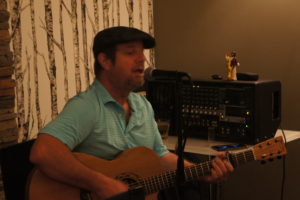Arthur James has always been adept at finding a niche for his acoustic blues presentations. The looming giant in New Hampshire’s blues scene just wrapped up a month long residency at the Manchester, New Hampshire Elm Street venue XO Bistro. During his last Monday night appearance, Arthur James treated his XO audience to several greasy, tasty blues standards.
Arthur James opened his first set with an instrumental, a chicken picking technique that allowed him to keep a low end pattern moving beneath slippery high notes that caught the ear with their emotive grist. Arthur James next went into his acoustic guitar version of Mose Allison’s “Parchman’s Farm.” Here, he kept his low end throbbing while he maintained higher weepy notes that spoke of the dreary existence of prison life. Meanwhile, Arthur James, with his husky rasp, let him deliver his vision of incarcerated life with moody grit and a sense of dwelling in a lonely place.
Charles Brown’s “Long Way Home” came to life with a forlorn feeling in the color and tone within Arthur James’ drawling vocal. One could feel true longing. Arthur James, when he belted out the line “ship out on the sea,” anyone in the audience could have felt the desperation of this number.
Belting “How Long” written by Leroy Carr and Scrapper Blackwell, considered to be the real Blues Brothers, Arthur James dragged the late night loneliness out of this one. Brittle notes fell from his acoustic six string like soft rain.
Arthur James’ treatment of Stevie Ray Vaughn’s “Life By The Drop” found the New Hampshire blues giant being deliberate with his six string, delivering compact, chunky notes. Speaking of Arthur James’ guitar work, the man played a jaunty groove on “American Crawdads,” driving home notes and chords that were ringing with depth, their tone speaking of emotions that are best expressed with music.
Arthur James’ handsome, raw vocal floated above his earthy interpretation of the melodic fiber from Johnny Cash’s “Ring Of Fire.” Next up, a steady persistent chord progression supported Arthur James’ vocal whimsy on “Blues, Blues, Blues,”an original Arthur James tune also marked by rugged, spirited fretwork.
Catchy guitar and foot stomping action let Arthur James capture the voodoo magic of Robert Johnson’s “Crossroad,” an old blues tune recorded many times over. Arthur James reached into the soul of this one with his emotive vocal push, singing over a combo of rhythmic snap and shinier high notes that registered with plenty of pluck.
Arthur James treated his XO Bistro audience to even more of his original numbers, like “Long Black Road,” from his Me Myself and I album. Steeped in blues low end drone at the bottom, Arthur James’ vocal was thick with emotion, determination on the surface while maintaining a lot of tenderness in the soulful center.
Arthur James likes to occasionally poke around in other genres, like American folk and British folk His take on “Kumbya” brought bluesy depth to this campfire sing along before he sang his heart out on “John Barleycorn Must Die,” a traditional arrangement popularized by British 1960s and 1970s rockers Traffic. Here, Arthur James employed a forlorn sadness to indicate the dire circumstances of such a challenging piece.
Beginning the next set with “Walk Back Home” Arthur James treated his audience to a Jimmy Reed style cadence. Moving onto Big Bill Broonzy’s “Trouble In Mind,” Arthur James kept the lilting melody and pace of this number intact. Arthur James’ original love song, “Susan’s Song,” was an exercise in measured tenderness. Arthur James turned Bob Dylan’s “Maggie’s Farm” into a blues folk tune, each repetition steeping the song ever deeper into the lyrics’ emotive power while the guitarist’s greasy slide work flavored it all into something independent of this song’s known influences.
Arthur James, again, made good use of slippery lead guitar work on an acoustic six string during Robert Johnson’s “Come Into My Kitchen.” Snappy thick rhythm work beneath snappy kernels of high notes was another thing that kept this chestnut roasting pleasantly in the XO Bistro venue. One could also hear each of Arthur James’ snap, crackle, and pop of high notes during his rendition of Canned Heat’s “Let’s Work Together.”
Arthur James’ “Oh, Yeah,” an ode to lust, reminded that some of the world’s greatest, most historic romances had sinful, sleazy beginnings. This blues singer-songwriter’s gusty vocal expression made clear that he really likes this song. Really, really likes it. His interval of notes are just too sly to be innocent. Arthur James sprawled his voice over his rhythmic thumping as well as his sneaky high notes that played peekaboo with the thick low end groove.
Arthur James got a sweet twang out of his acoustic six string during a Hank Williams tribute before treating his audience to a hearty throated presentation of a Ten Years After classic. Its familiar driven rhythm and haunted melodic twists in his upper registers brought Arthur James’ presentation to an impressive close.
Arthur James makes a mountainous impression on all who hear him, whether they are hearing him for the first time or for the 27th time. He has true grit in his simultaneous lead and rhythm playing on his acoustic guitar as well as for his hearty vocal applications at the microphone. XO Bistro on Manchester’s Elm Street made a good home for this solo acoustic blues artist, as its vibe is at once homey and funky.


